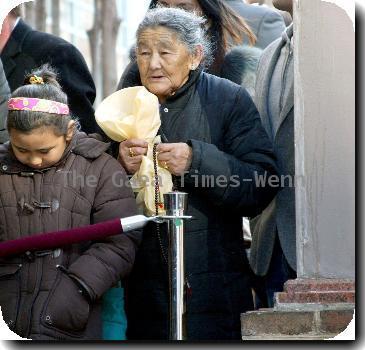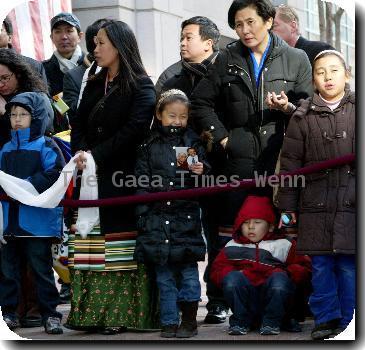NY Gov. David Paterson drops bid for election under pressure from concerned Democrats
By Michael Gormley, APFriday, February 26, 2010
NY Gov. Paterson drops election bid under pressure
NEW YORK — Less than a week after declaring he would seek a full four-year term, New York Gov. David Paterson abruptly dropped his election bid Friday under pressure from fellow Democrats concerned about his faltering agenda and his handling of a domestic abuse case involving a trusted aide.
Paterson cited a litany of distractions that prompted him to end his campaign, but said he had never abused his office.
“But I am being realistic about politics,” he said. “It hasn’t been the latest distraction. It’s been an accumulation of obstacles that have obfuscated me from bringing my message to the public.”
Paterson insisted that he would not resign and pledged to serve out his term “fighting for the state of New York.”
Paterson became governor in 2008, when former Gov. Eliot Spitzer resigned in a prostitution scandal. But during his two-year tenure, he seemed to be overwhelmed by one crisis after another: a bungled appointment to an open U.S. Senate seat, a budget standoff with the state Legislature, and, just this week, a damaging New York Times report, which said the governor and a member of his security detail had contacted a woman pressing an abuse charge against a top Paterson aide.
On Friday, he said he would be vindicated by the criminal investigation he called for into his administration’s handling of the matter.
Raising his right hand beside his wife, Michelle, he told a crowded press room: “I give you this personal oath. I have never abused my office. Not now, not ever. I believe that when the facts are reviewed, the truth will prevail.”
Paterson had publicly prided himself on beating the odds, including overcoming blindness to rise through treacherous New York politics. When he formally announced his campaign just six days ago, he vowed “This governor is not going to quit.” But his tenuous party support quickly evaporated.
“He started out as a nice guy with the best wishes from everyone, and it just went downhill,” said Maurice Carroll of the Quinnipiac University poll. “As a personal story, it’s too bad because everyone who ever knew David Paterson liked him.”
Paterson has been weighed down by low approval numbers for months. His support within his own party was dwindling, and his campaign bank account paled in size to those of his rivals.
The city’s leading tabloids called for his resignation in front-page editorials Friday.
“Time to go, Dave,” the New York Post said in its headline. The New York Daily News said that Paterson had “demeaned his high office” and was not trustworthy.
Politicians from both parties praised the governor’s decision, and most Democrats said he should not have to resign.
“I’m sure that he could have continued his campaign, but he did the right thing,” said Jay Jacobs, the state Democratic party chairman. “We will not have a divisive primary at the top of the ticket.”
Paterson’s decision to abandon the race paved the way for state Attorney General Andrew Cuomo to make an unimpeded run for the Democratic nomination.
Cuomo, son of former Gov. Mario Cuomo, has already built a campaign fund five times larger than Paterson and consistently outpolled Paterson among New York Democrats, who hold a 2-to-1 edge over Republicans statewide. But he has declined to say whether he will run for governor.
Cuomo released a statement Friday saying only that he was focusing on his job as attorney general and would announce his plans “at the appropriate time.”
The only announced GOP candidate in the race, former congressman Rick Lazio, called Paterson’s announcement “another sad chapter in New York state government. It’s dysfunctional, it’s broken and it doesn’t work.”
Paterson’s problems intensified in recent weeks with a series of critical articles in the Times.
One report portrayed Paterson as distant and detached from the job, spending time hobnobbing with rich patrons instead of traveling the state seeking support for his agenda and his candidacy. In the article, current and former aides were critical of the governor for relying on a handful of loyalists instead of seasoned political pros.
At Friday’s news conference, the governor repeatedly portrayed himself as a victim of a hostile press corps.
“I was very disturbed that for three weeks, unsubstantiated rumors … lined the front pages of a lot of the newspapers and demanded a lot of coverage,” he said. “It was impossible and very difficult for me to stop that.”
Paterson started 2009 by bungling the appointment to fill the Senate seat vacated by Hillary Clinton. Many Democrats, including the Kennedy family, were upset when he passed over Caroline Kennedy. Then one of Paterson’s aides leaked unsubstantiated rumors about her.
The governor has also been engrossed in a budget battle with lawmakers over how to ease an $8.2 billion deficit. The Democrat-led Assembly and Senate have criticized Paterson for his proposed $1.1 billion in school cuts. The leadership can’t even agree on how much money the state has.
The most recent Times article, published Thursday, raised questions about how Paterson and state police officials responded to a domestic abuse complaint lodged against a trusted aide from Harlem named David Johnson. More than a decade ago, Paterson took Johnson on as an intern as part of his efforts to help young people ensnared in Harlem’s crack epidemic.
In court, the woman had complained that the state police were pressuring her not to level criminal charges against Johnson, according to a transcript. The newspaper also said Paterson spoke with the woman personally, although the governor’s office said it was the woman who placed the call.
Paterson suspended Johnson and called for Cuomo’s office to investigate his administration’s handling of the matter. But renewed calls for Paterson’s exit were made hours after the story was published.
At the White House — which had called earlier for Paterson to drop out of the 2010 race — press secretary Robert Gibbs on Friday called the recent reports “disturbing” and said “it’s safe to say” that they vindicate the administration’s earlier position.
Paterson was the scion of a Harlem political power base that included his father, former state Secretary of State Basil Paterson; the late Percy Sutton, who was Manhattan borough president; Rep. Adam Clayton Powell; former Mayor David Dinkins; and embattled Rep. Charles Rangel.
But Paterson, an affable, slightly built politician, was never really seen as gubernatorial in the eyes of legislators, lobbyists or voters. He was Senate minority leader when he was picked by Spitzer to be his running mate. Until he recently insisted on more formality, his staff and even rank-and-file lawmakers referred to him as “David.”
After rising to office, he confronted allegations of sexual affairs and drug use. He held an extraordinary news conference detailing past affairs he and his wife were involved in during an 18-month period when it appeared their marriage would end. He also recounted past drug use from his youth.
On Friday, he talked about what he hoped would be his legacy, citing his work to eradicate the Rockefeller drug laws, tighten spending, and raise the involvement of female- and minority-owned companies in state contracting.
“I hope that history will remember that I fought the good fight,” he said, “that I did what was hard, and I put the people first.”
Gormley reported from Albany. Associated Press writers Liz Sidoti and Jennifer Loven in Washington, Valerie Bauman in Albany and Cristian Salazar in New York also contributed to this report.
Tags: Albany, Geography, Hillary Clinton, Municipal Governments, New York, New York City, North America, Political Resignations, United States



